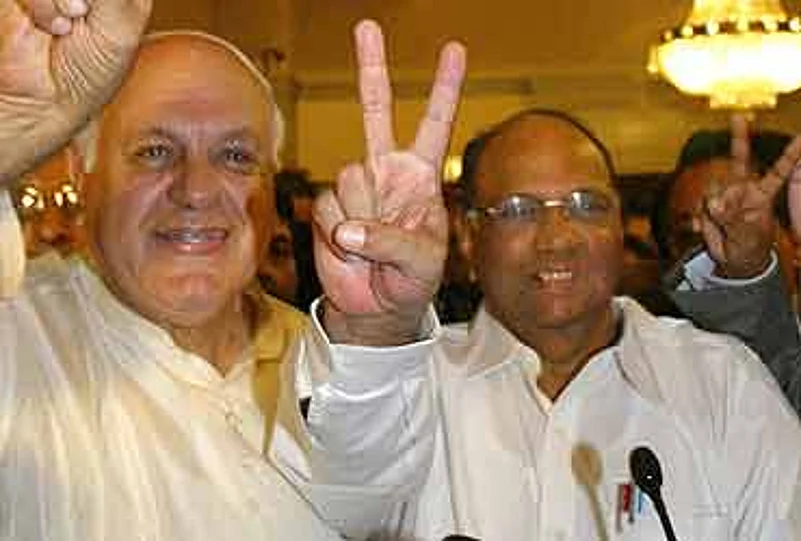
Finally, Sharad Pawar has done what all the others could not for as many as21 years. And it perhaps took more guile and planning than any state or nationalelections would have called for from the master tactician. The help andexpertise of the former presidents Raj Singh Dungarpur and I S Bindra also camein handy in mastering a coup that finally dethroned Dalmiya as the de facto headhoncho of cricket administration in the country.
The elections last year had seen Ranbir Singh Mahendra pip Pawar 16-15, thanks to the controversial deciding vote byDalmiya. But this time the Pawar play included meticulous planning in plotting the downfall of the Dalmiya camp: they had already issued a signed list of supporters who had pledged to back Pawar in the powerstruggle and it is that which resulted in his unambiguous and thumping victoryby a whopping margin: 20-11. Dalmiya camp lost all the other top posts by identical 18-13 margins.
Last time around, the Dalmiya camp was up to their legal and technical wizardryand had generated a deliberate dispute over the representation of Maharashtra and Dyaneshwar Agashe, a Board member for 20 years, who was not allowed to vote.Likewise, instead of Lalit Modi voting for the Rajasthan Cricket Association, aDalmiya man was allowed to vote, and best of all, instead of the outgoingpresident overseeing the election, by getting himself appointed as Patron-in-chief of Indian cricket and observer of the 2004election, Dalmiya had also had the casting vote which had turned out to bedecisive. (Dalmiya had also got a stay order from the Madras High Court on former BCCI president A C Muthaiah'splea seeking the appointment of a judge to oversee the election)
The AGM to elect the BCCI president this time around was earlier scheduled to be held in September-end but had to be adjourned sine die amid legal wrangling and mud-slinging among the rival factions. As various units of the BCCI moved the courts in different parts of the country, the Supreme Court had ordered the BCCI to complete the election process by November 30 and appointedKrishnamurthy, the vastly experienced former Chief Election Commissioner, as an observer to the elections.(This was all in the middle of the focus being shifted to the leaking of thecontroversial e-mail by Greg Chappell)
Predictably both camps indulged in bitter and fierce legal wrangles to disqualify associationswho would not vote for them. The Pawar camp had wanted the court to appoint a three-man panel to oversee the elections. These observers would have had the power to disqualify voting associations, but they were dismissed, following another legal battle in theCalcutta High Court by Dalmiya.
And then there was the dispute with Bihar and Jharkhand as both theseassociations wanted separate voting rights. It was then that the Supreme Court appointedKrishnamurthy as sole observer for the elections. The suspense over representation, that led to bitter court battles and bad blood at the last AGM as also the adjourned meeting in September, ended a little after noon yesterday withKrishnamurthy resolving the disputed cases and releasing the full list of members allowed tovote: Jharkhand had been given voting rights.
The Dalmiya camp was happy with that but not with the fact that Krishnamurthyalso cleared the Himachal Pradesh representative to vote and allowed two votes from Uttar Pradesh and Himachal Pradesh and also said that Bihar could vote on the morning of the election.
The orders were passed on Tuesday morning after the Sharad Pawar group challenged Monday's order of the observer allowing votes from UP, HP and Jharkhand, which had given an edge to the Dalmiya group.Unconfirmed reports however kept leaking out that many representations were madeto Krishnamury in the wee hours of the morning. The rumour was that rivalfactions in the three contentious associations - Himachal Pradesh, Uttar Pradeshand Bihar/Jharkhand - would be allowed to vote, in sealed envelopes, and thatthe votes would be counted later depending on which group was considered theauthorised representative. Eventually, the difference of nine made these threevotes irrelevant.
But Jagmohan Dalmiya, like Lalu Prasad Yadav in Bihar, had some things to sayagainst the Observer: "It was not a debacle for us. One of our genuinevoters was asked to sit out while a complete stranger who had nothing to do withcricket was allowed to vote. The Observer was there to see elections are heldproperly. But surprisingly, he started giving affiliations."
He also hinted that his group would place their point of view in the SupremeCourt when the case would come up for hearing on December 12. Dalmiya said atbest the verdict could have been 16-15 in favour of Pawar. On whether there wasany political pressure in favour of the Pawar camp, he said, "I do not wantto go into this. But, if a politician contests for a post in a sports body, itis always bound to make some difference. If you want to involve politicians incricket affairs, then it's better to nationalise BCCI."
However, Dalmiya said he accepted the verdict and extended support for thenewly-elected BCCI president. "I accept the verdict. My good wishes arewith their team and if they require my support or cooperation in running theaffairs of the BCCI, I will always be there," he said.
The Dalmiya-backed outgoing BCCI chief Ranbir Singh Mahendra, who lost to Pawar,also criticised the decision of the Observer in depriving Himachal Pradesh ofits vote. "Everything was working against me. First, I was deprived of myvote. Then Himachal Pradesh was debarred," he said.
In any case, as it turns out, this is one victory that Pawar would probablycount as one of his most hard-fought for.
















